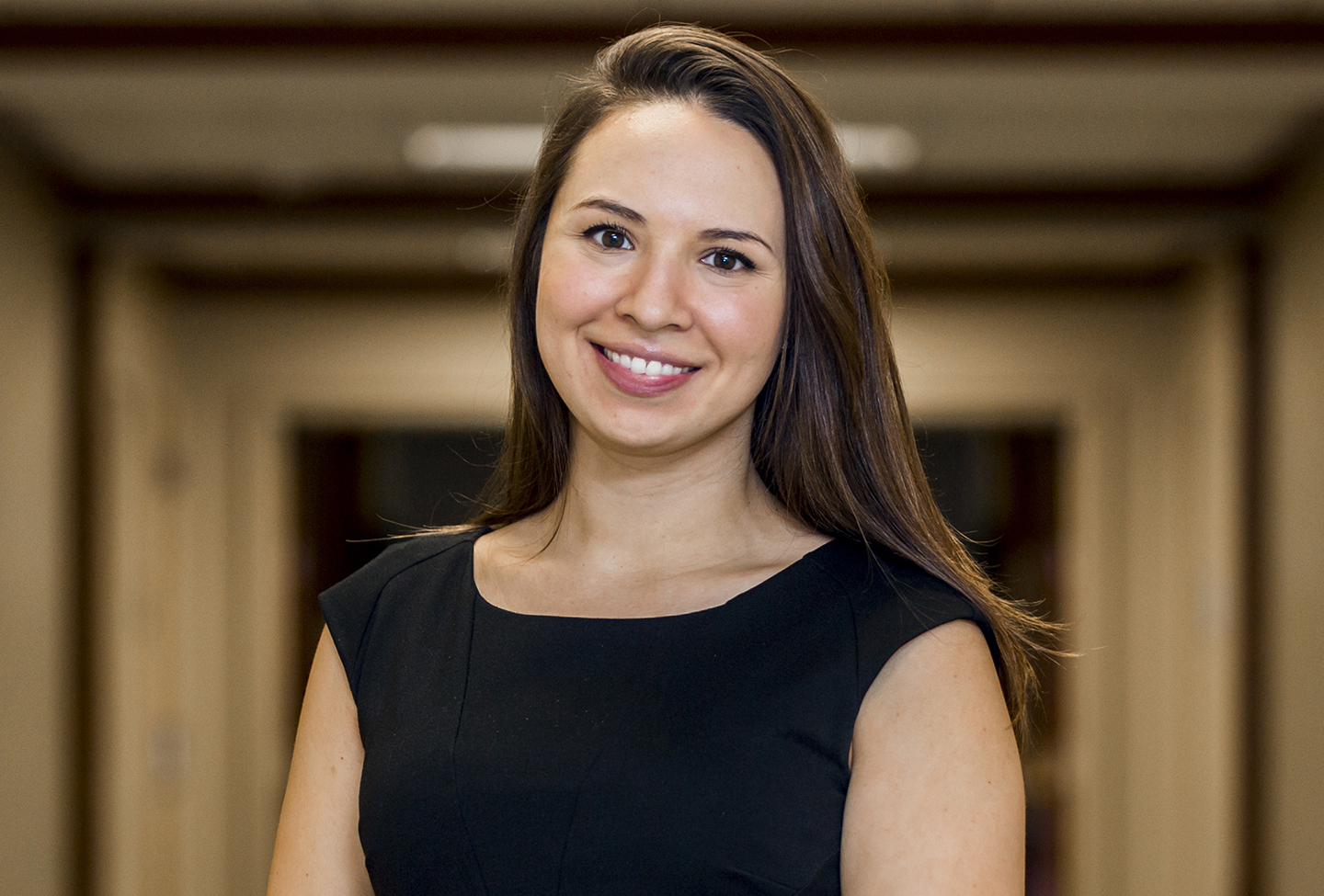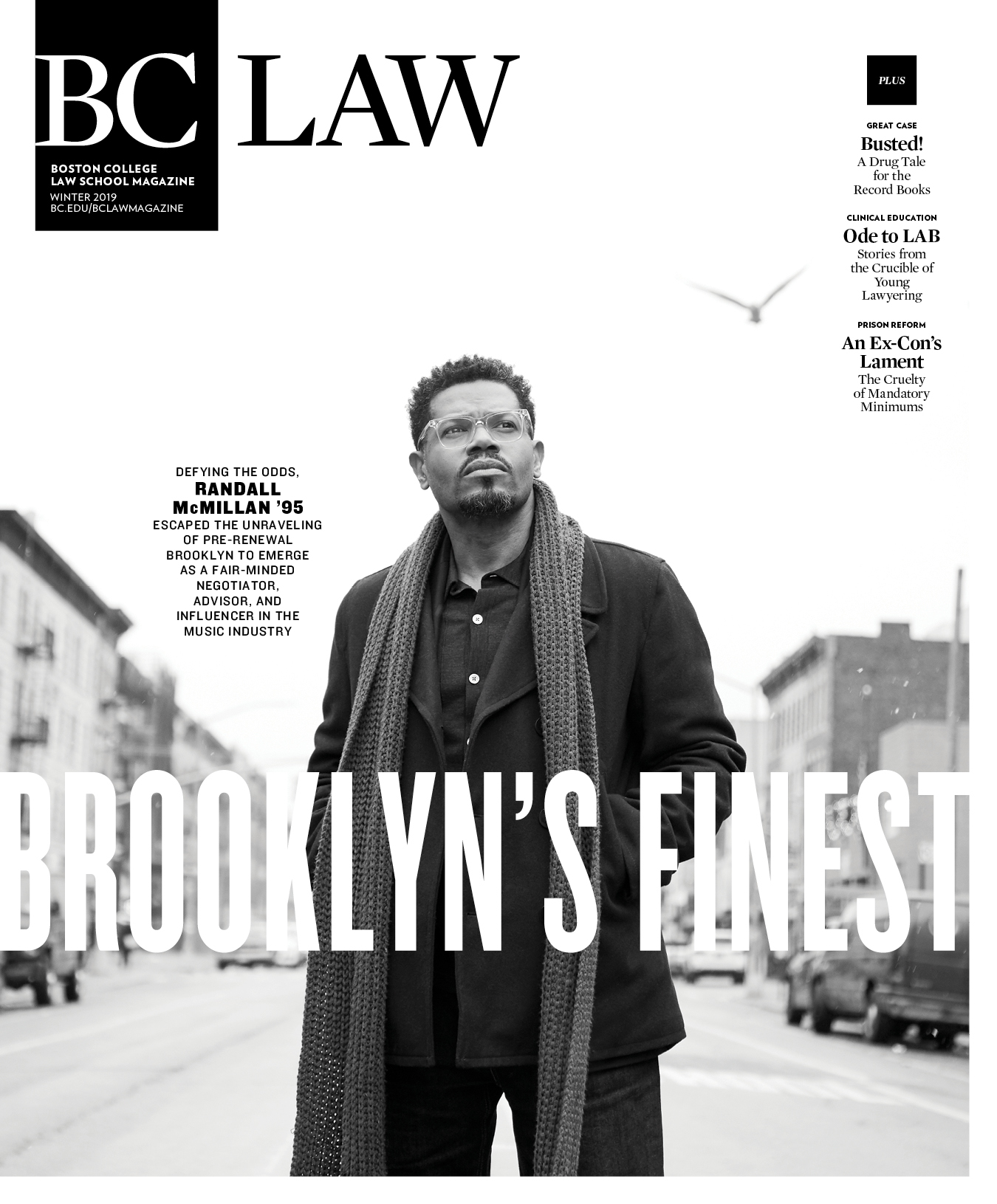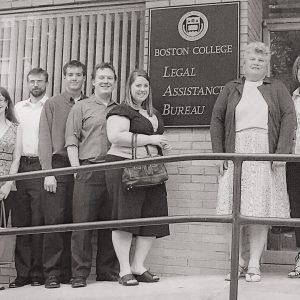
‘God Don’t Like Ugly’
by Melina L. Muñoz Turco ’15
“God don’t like ugly,” Theo’s grandmother said, speaking of the reason a family member had decided he wasn’t going to care for Theo anymore. Theo was just too much to handle. “God don’t like ugly.”
But Theo’s life up until that point was just that: ugly. It’s not that his grandmother was blameless, but it also wasn’t her fault—all the ugly in Theo’s life. And while Theo wasn’t perfect, there is only so much ugly a child can bring into his own life. So, who was to blame for everything that happened to Theo, because of Theo, whatever? I don’t have a clear answer to that, although it’s a question I’ve grappled with since my 2L year, when I represented Theo as a JRAP [Juvenile Rights Advocacy Project] student.
Here is what I do know. I know that by the time my case partner and I picked up his file, Theo had been between the homes of multiple family members, in DCF custody, and in DYS lockup. I remember that Theo had been through nearly as many living arrangements and school systems as the number of years he had lived. I remember thinking: It’s no wonder why Theo made some of the choices he made. I remember thinking: This is a true system failure. Our system failed Theo.
Theo was fifteen when I started working with him through JRAP. He was coming out of DYS lockup (“juvie”) and needed some of the basics in place: a legal guardian and educational support. Theo’s mom had abandoned him and his dad committed suicide, all when Theo was very young. He felt alone, really alone. And he blamed himself for being left alone. He believed that maybe, if it wasn’t for him, his dad wouldn’t have killed himself. Talk about ugly.
Theo needed an adult he could trust. He felt abandoned by his parents, and while his grandmother and uncle took turns taking him in, they couldn’t handle Theo’s behavior. Behavior that I’m sure was a direct result of him being abandoned by his mom and believing that he was the reason for his dad’s suicide. So, Theo acted out and his legal guardian at the time decided to miss Theo’s guardianship-related court dates. Into the state system Theo went.
You don’t have to do much digging to learn that kids need stability and trusting, consistent adult relationships to flourish. As I’ve mentioned, Theo had neither back then, not really. Lacking the needed structure and support, he made some minor mistakes that resulted in major consequences. Consequences that everyone in JRAP agreed were too severe. Theo ended up in a hardware-secure DYS facility—a place where you couldn’t go through one door without the one behind you locking, where barbed wire ensured you wouldn’t try to get out. A place where the not-so-tough kids had to be tough, or else. Trust me when I say, Theo’s punishment did not fit the crime. But when I met him, he was in a place where he had to act like it did. Our system—the system that moved Theo from home to home to home, from school district to school district to school district—failed a boy who was fragile from the start. It broke my heart.
Theo needed someone to listen, really listen, and see him, really see him. He wasn’t exactly going to play it close to the chest if you did. He wore his heart on his sleeve like that. But he wasn’t necessarily going to make it easy for just anyone to get to know him either. I’ll tell you this: If you really listened and showed him consistency, Theo let you know what you had to know. Even when he wasn’t telling you something straight out, he would tell you by the inflection of his voice or by the way he smiled. You just had to pay attention. If you did, he trusted you. That was something special.
With the support of JRAP, my case partner and I asked Theo to make tough decisions and answer tough questions. Once he knew he was able to trust us, he did. We asked him to make decisions about guardianship and school. We asked him what he needed to thrive. We even asked him what he wanted to do about a family member whom we suspected was stealing tens of thousands of social security survivor benefits from him. They weren’t easy questions to answer, but over time, Theo confided in us. Theo worked with us to find his answers; he led the way. With time and support from JRAP, Theo’s grandmother also felt ready to step up and agreed to be his legal guardian.
Theo’s story has stuck with me in a real way. He taught me what it means to be a lawyer for a young person. He taught me what happens when we actually listen to young people. And he taught me that things aren’t always as they appear. God don’t like ugly and, although his story had ugly parts, nothing about Theo was ugly. Yes, he made mistakes and, yes, there had to be consequences. But he did not get a fair deal. He still found a way to fight on, though. He found a way to trust us, even though other adults had failed him time and time again. It wasn’t perfect but it was Theo. And Theo is pretty cool.
Photograph above: Melina L. Muñoz Turco ’15 (Credit: Caitlin Cunningham)
Saving Mary
by Yaron Dori ’96
Mary was an elderly woman living in a Boston suburb who was the victim of a home renovation project gone awry. But this was no ordinary home renovation project. She was approached by a contractor who proposed to subdivide the lot on which her house stood and construct two new homes in its place, one for her and one for him. The contractor said he would undertake this project at no charge to Mary, provided she conveyed the second home and the lot on which it stood to him at no charge. Mary agreed, and shortly thereafter the contractor moved Mary into a temporary trailer on her property and demolished a substantial portion of her home.
Then he disappeared.
Then Mary learned she had cancer.
Mary continued to live in the trailer, but it was not easy. She underwent cancer treatment but her prognosis for recovery was bleak. Around this time, Mary’s aunt, with whom she had not been particularly close over the years, entered the picture. Unlike Mary, the aunt had financial resources. She assessed Mary’s predicament and proposed to pay for a new contractor to repair Mary’s home so Mary could return to it. Mary was grateful, thinking that if she succumbed to her disease, at least she would succumb to it in her home. The contractor repaired a substantial portion of the home and Mary moved back in.
Subsequently (and surprisingly), Mary’s cancer went into remission. That is when Mary’s aunt claimed that the sums she paid the contractor to repair Mary’s home were not a gift to Mary after all but rather a loan of tens of thousands of dollars that Mary would have to repay or forego her home.
Mary turned to LAB.
Mary’s case was formative to my BC Law School experience and to my development as a lawyer. I recall the day that Paul Tremblay handed me the file, noting that the case likely would present certain challenges, some of which were as basic as developing a definitive chronology of events and collecting documentary evidence to support it. I would need to figure out not only what happened but also be able to prove it. I would need to develop a theory of the case to explain what happened and why, something Alan Minuskin emphasized in the pretrial litigation course I took the semester before I joined LAB.
I visited Mary in her home to introduce myself and get a sense of her environment. To this day, when I work on pro bono matters, I urge my colleagues to visit the client at home. You can learn a lot about someone that way and, sometimes, get a better sense of how the situation looks from the client’s perspective. People also tend to be more open with you when they are at home.
Mary’s aunt was represented by counsel. I thought that he would be smug, perhaps condescending, in dealing with me. I was just a young law student. I knew very little about practicing law, even less about cancer or building a home. Ironically, those factors ended up helping me. I later decided that opposing counsel probably was not altogether pleased to be litigating this case against me. I had far more time than he possibly could have had to delve into the facts, to collect evidence, to consider the issues. And, of course, I had Paul Tremblay and the resources of LAB to guide me.
That made all the difference. Professors Tremblay and Alan Minuskin had taught me that to win a case you have to focus not only on the whatbut also on the why. Why would Mary’s aunt, who had not been close to Mary, agree to fund the repairs to her home? If it was out of altruism, that now seemed to be in short supply. Eventually, we theorized that Mary’s aunt funded the repairs in the misguided hope that she would inherit or otherwise gain rights to the home when Mary died.
But Mary survived, and the case culminated in a one-day bench trial in Waltham District Court. I wore a suit (my only suit). I stood before the bar. I delivered an opening statement. I undertook the direct examination of witnesses. Occasionally, I even objected. For a few hours during my tenure as a law student, it felt like I was practicing law. The judge was patient with me, but at times I sensed that she also had to be patient with opposing counsel, which made me feel better.
Weeks later, the judge’s decision arrived in the mail (decisions arrived by mail back then). The judge had been persuaded by our case. She found no basis to conclude that Mary had agreed to borrow money from her aunt or that her aunt had any credible basis to believe that Mary would repay it or convey her home. Mary would keep her home and presumably spend her remaining years in it. The resources of LAB made a real difference, both to Mary and to me.
What Would F. Lee Bailey Do?
by Stephen Kunken ’72
During my last year of law school, Ibecame involved with LAB and represented clients in the Dedham District Court.
One client (Mr. Jones), aged sixteen, was accused along with his twenty-year-old co-defendant of unauthorized use of a motor vehicle, possession of stolen license plates, and other violations. I appeared with him in court, and we worked out a disposition to one of the lower violations, with a sealing of his record and an agreement to testify against the co-defendant (Mr. Smith), who was facing a violation of probation charge due to this new arrest.
My client appeared before the presiding judge, was sworn in, and pleaded guilty to the reduced charge, admitting that he had been behind the wheel of the car when the police approached, but only because he had to keep his foot on the gas pedal to prevent the car from stalling while his co-defendant, who had taken the car and was the driver, had gotten out to make a phone call at a nearby phone booth. I was very pleased with the disposition, and I arranged to meet my client the following week for his testimony against his co-defendant.
When we appeared in court, the same prosecutor who had taken his plea the week before briefly reviewed what he was going to ask the client on the witness stand, and then called him as the first witness when the non-jury trial began. I was sitting in the spectator section when the questioning focused on the arrest:
PROSECUTOR: Where were you when the police first approached the car.
CLIENT: I was sitting in the driver’s seat.
PROSECUTOR: And who had driven the car to that location?
CLIENT: I did.
PROSECUTOR: Perhaps you didn’t understand the question. Who drove the car to that location?
CLIENT: I did.
PROSECUTOR: Didn’t you tell the police that Mr. Smith had driven the car?
CLIENT: I never said that. The police are lying. Mr. Smith never drove the car. I took the car and I was the only driver.
JUDGE: Mr. Jones, do you remember me from last week? You appeared before me in this courtroom, took an oath, and stated that Mr. Smith had driven the car. Do you remember saying that to me last week?
CLIENT: Your honor, I was the one who drove the car. Mr. Smith had nothing to do with it.
JUDGE: I am going to direct the prosecutor to investigate potential perjury charges against Mr. Jones.
In the back of the courtroom, I was desperately trying to remember if Professor [John] Flackett had ever covered this problem in Criminal Law I (he hadn’t). I looked around, but there were no supervisors available to come to the rescue. I thought to myself : What would F. Lee Bailey do in this situation?
I very slowly rose from my seat, and in a very low voice, said:
KUNKEN: Your honor, I am a third year law student at BC Law School. I represented Mr. Jones before you last week. Would the court be willing to take a short recess so that I can talk with my client?
JUDGE: That is an excellent idea. The court will take a ten-minute recess.
Outside the courtroom, the first thing my client asked was, “Am I in trouble? Am I going to jail?” I responded that it sure looked that way, and that by trying to help his “friend,” he was putting himself in jeopardy. “Well, what should I do?” (Good question!).
“I suggest that you go back into court, apologize to the court, and tell the truth,” I said.
We went back into the courtroom.
KUNKEN: Your honor, my client would like to say something to the court.
JUDGE: Very good. Mr. Jones, come back up here to the witness stand. What would you like to say to me?
Whereupon, Mr. Jones apologized, retracted his previous statements, and proceeded to testify as to what happened the day of the arrest.
I sought out a supervisor after the court session and advised him of what had happened. He told me that I had handled the matter appropriately, which reinforced my goal to concentrate in criminal law after graduation, and not switch to trusts and estates!



